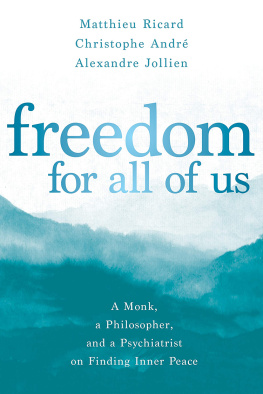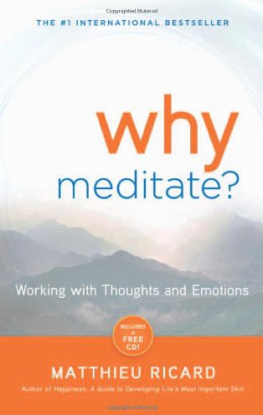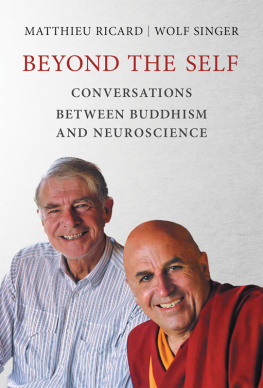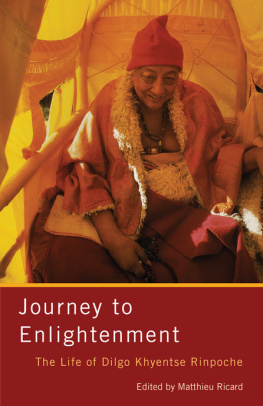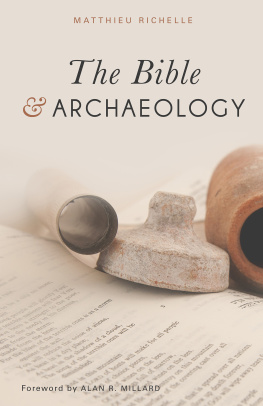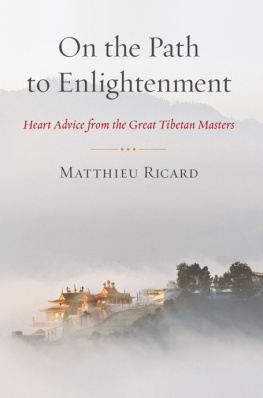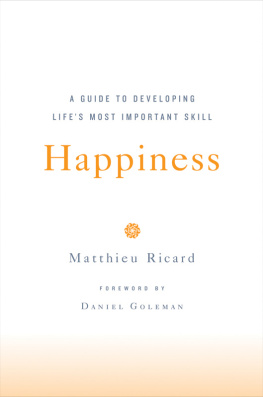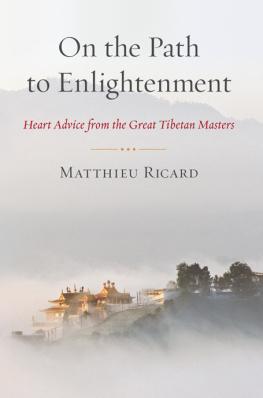
Sounds True
Boulder, CO 80306
2020 Matthieu Ricard, Christophe Andr, and Alexandre Jollien
Sounds True is a trademark of Sounds True, Inc.
All rights reserved. No part of this book may be used or reproduced in any manner without written permission from the author(s) and publisher.
LIconoclaste et Allary ditions, 2016
Published by special arrangement with Allary ditions in conjunction with their duly appointed agent 2 Seas Literary Agency
Published 2020
Cover design by Lisa Kerans
Book design by Kate Kaminski, Happenstance Type-O-Rama
Printed in the United States of America
Library of Congress Cataloging-in-Publication Data
Names: Ricard, Matthieu, author. | Andr, Christophe, author. | Jollien,
Alexandre, 1975- author. | Chdzin, Sherab, translator.
Title: Freedom for all of us : a monk, a philosopher, and a psychiatrist on
finding inner peace / Matthieu Ricard, Christophe Andr, Alexandre
Jollien.
Description: Boulder : Sounds True, 2020.
Identifiers: LCCN 2020028204 (print) | LCCN 2020028205 (ebook) | ISBN
9781683644828 (trade paperback) | ISBN 9781683644835 (ebook)
Subjects: LCSH: Peace of mind. | LibertyPsychological aspects. |
Self-realization.
Classification: LCC BF637.P3 R5713 2020 (print) | LCC BF637.P3 (ebook) |
DDC 170/.44dc23
LC record available at https://lccn.loc.gov/2020028204
LC ebook record available at https://lccn.loc.gov/2020028205
10 9 8 7 6 5 4 3 2 1
The outward freedom... that we shall attain will only be in exact proportion to the inward freedom to which we may have grown at a given moment.
Mohandas Gandhi
Preface
Were not going to work!
This is what all three of us decided. We had planned to get together for a few days in midwinter, as we have in previous years. Were not going to do any work; were just going to get together for the fun of it talk, laugh, enjoy the fresh air. Our dear friend Delphine had invited us to her mountain chalet, high up in the heart of the Alps. Everything was set for a week of vacation in this peaceful haven. We planned no more than roaming about in the snow, enjoying a few cheese fondues, a little reading, and a relaxed time. But then...
By the end of the first afternoon, we found ourselves in the pine-paneled sitting room with its views of the surrounding summits. In a good mood, sitting by the fire, listening to the flames crackle, we picked up our discussions again as if they had never been interrupted. Within the sweet warmth of unconditional companionship, serious subjects started coming up along with our jokes and laughter subjects like how to deal with states of dependency and how to stay on course when sad passions, or heavy depression, seem to be pushing us headlong into despair.
Once more an urge to keep track of what we were saying, to share with others, started coming up. We were soon saying that it would be a shame to let all these ideas just go down the drain, that we should save them at least for ourselves, keep some record of these exchanges of ours that we ourselves were finding so rich and engaging. So our indefatigable Matthieu put a microphone on the table just in case, so we wont be sorry later, so we dont forget anything. His two accomplices did not object.
Though it didnt seem like a big deal, knowing the microphone was there was stimulating. It kept us from spacing out while our companions were talking; it pushed us to develop our thoughts more coherently. In the end, it reminded us of our readers their hopes, their expectations, and their legitimate needs. Then it was as though our readers were there with us, sitting beside us on the couches. And little by little we got caught up in the whole thing.
The question of freedom presents itself as an invitation to look into things deeper, to drill down, to develop a more appropriate approach to life, to create appropriate tools. It calls on us to shake ourselves out of our state of automatic pilot, to break free from the prison of habitual patterns, to try to achieve something more. It is a huge question that requires us to go back over things in order to look in a new way at what is really one of the great challenges of life.
From moment to moment, we are called upon to undergo a complete conversion to deal with our mental toxins, drop our conditioning, and go deeper within ourselves in the direction of our true nature, which is freedom. Since human beings are not born free but may become so, a whole process of mind training is necessary. This is the area of endeavor the three of us were attempting to explore on the basis of our experience. Getting beyond our concern for what others might think of us, getting beyond any form of narcissism, beyond the egoism that drags us down these were a few of the challenges involved in our commitment to the total ecology of being that we wanted to sketch in these pages.
A word of caution about the significance of our remarks: they might seem like teachings, but they are only the musings of three friends in search of inner progress three friends who are interested in sharing their experiences, successful or unsuccessful the efforts they have made, and their way of looking at things. The remarks we have transcribed in these pages are a faithful reflection of the exchanges we had. Spontaneous and imperfect as they may be, they are sincere and in keeping with the choices we have made in our lives. In editing them down, we simply passed them through the sieve of the following questions: Is what we are saying clear enough? (No jargon we hate that.) Is it helpful? (What interests us is real change, not just talk.) Is it accessible to everyone, not just to a few sages or intellectuals?
The Greek philosophers created a very beautiful concept: metanoia. Metanoia is a way of working on oneself. It requires an intimate conversion, a radical self-transformation leading to a way of life that saves us from the sad passions, from impulsiveness, from egoism, from the prison of habitual patterns. Advancing spiritually, making inner progress, shedding what weighs us down, liberating ourselves for our own sake as well as for the sake of the entire world those are the things that make up the great challenge that is at the heart of this book.
We hope that our humble dialogue may encourage our readers to take up this challenge as well.
Introduction
What Is Inner Freedom?
Matthieu The word freedom mainly evokes the aspiration of all beings to lead a life free from imprisonment, oppression, and deprivation of basic rights. But what we would like to talk about here is inner freedom. We are, nearly all of us, the plaything of our whims, our conditioning, our impulses, our inner conflicts, our wandering thoughts, and our afflictive emotions. This servitude of ours is at the root of much that torments us. How do we free ourselves from the prison of these mental mechanisms, in the face of which we often feel helpless, even resigned?
The main difficulty here comes from a lack of insight. We are not able to identify these mental mechanisms or to spot the types of thoughts that enslave us. Wisdom, the lucidity and competence that would allow us to regain our freedom, is too often lacking. Inner freedom could be achieved though better comprehension of how our mind works and through clearer understanding of the mechanisms of happiness and suffering. Developing this type of insight is a matter of training training that permits the mind to manage afflictive mental states with ease and intelligence.
It is our hope that this book will clarify the means for freeing ourselves from the causes of suffering. Inner freedom brings us great strength and makes us less vulnerable to our own thoughts, which sometimes arise as enemies. It also makes us less vulnerable to external conditions, which are always changing. We feel less vulnerable, we are less centered on ourselves, and we are more open to others. Inner freedom naturally expresses itself as an increase in compassion. Bottom line: everybody wins.
Next page
